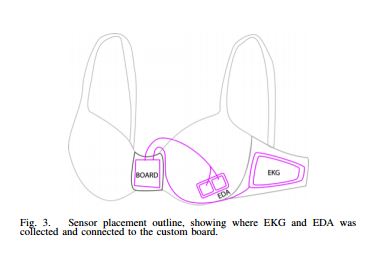I spotted this study “Food and Mood: Just-in-Time Support for Emotional Eating” yesterday. Although I am very limited with time this week, I wanted to report it, even if mostly by quoting the report.
 A research group led by Mary Czerwinski from Microsoft Research has studied emotional eating and ways to intervene, and they’ve come up with an interesting idea: an intelligent bra that sends info that is reported by your mobile phone application (it uses an image of a tree that needs gardening to represent your body).
 Here’s the study’s abstract:
Behavior modification in health is difficult, as habitual behaviors are extremely well-learned, by definition. This research is focused on building a persuasive system for behavior modification around emotional eating. In this paper, we make strides towards building a just-in-time support system for emotional eating in three user studies.
The first two studies involved participants using a custom mobile phone application for tracking emotions, food, and receiving interventions. We found lots of individual differences in emotional eating behaviors and that most participants wanted personalized interventions, rather than a pre-determined intervention.
Finally, we also designed a novel, wearable sensor system for detecting emotions using a machine learning approach. This system consisted of physiological sensors which were placed into women’s brassieres. We tested the sensing system and found positive results for emotion detection in this mobile, wearable system.
The study offers a scenario I definitely can relate to it:
Sally has been home from work for a few hours, and she finds herself rather bored. An application on Sally’s mobile phone has also detected that she is bored by reading her physiological state through wearable sensors. Since this mobile application has previously learned that Sally is most susceptible to emotional eating when she is bored, the application provides an intervention to distract Sally and hopefully prevent her from eating at that moment.
 The research group was pleased with the results and see that it is feasible to fairly accurately detect emotions based on sensor data and a person’s own input. New research will also try to test bracelets, etc., to include men as well.
Would you give it a go? I think I could try it for sure if it would control my stress eating, which is a bad habit of mine.


For this to work, a woman would have to be very serious about tackling her emotional eating issue. I like the idea of it being personalized. I wonder how bulky the sensor system is?